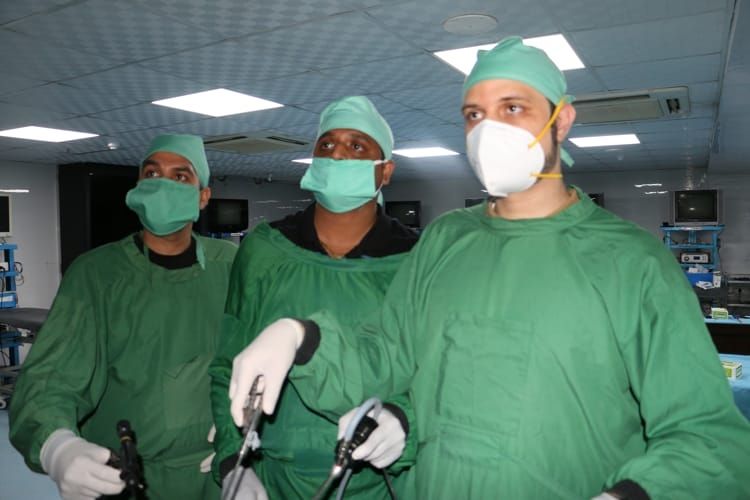Event Date: Fri - 19 May, 2023
Event Time: 9:25 am
Location: World Laparoscopy hospital
Institute: WLH
At the World Laparoscopy Hospital, live tissue dissection has become an integral part of surgical training and advancement in the field of laparoscopic surgery. Surgeons from around the world gather at this renowned institution to practice and refine their skills on live tissue samples.
Live tissue dissection allows surgeons to perform procedures in a simulated surgical environment that closely resembles real patient scenarios. The tissue used for dissection is carefully selected to mimic the characteristics and structures encountered during actual surgeries. This provides an invaluable opportunity for surgeons to enhance their understanding of anatomical structures, practice precise dissection techniques, and refine their laparoscopic skills.
During laparoscopic fundoplication, surgeons use live tissue models to learn and master the techniques involved in correcting gastroesophageal reflux disease (GERD). This procedure involves creating a new valve mechanism to prevent the backflow of stomach acid into the esophagus.
Heller's myotomy, a surgical procedure used to treat achalasia, is another technique practiced through live tissue dissection at the World Laparoscopy Hospital. Surgeons can perform precise myotomies on live tissue models to release the constriction of the lower esophageal sphincter and improve the passage of food into the stomach.
Nephrectomy, the surgical removal of a kidney, is also practiced on live tissue samples. Surgeons can refine their laparoscopic techniques, including dissection, hemostasis, and organ extraction, while ensuring patient safety and minimizing risks.
Splenectomy, the surgical removal of the spleen, is another procedure performed on live tissue at the World Laparoscopy Hospital. Surgeons can practice laparoscopic approaches to spleen removal, optimizing the technique for minimal invasiveness and improved patient outcomes.
Side-to-side anastomosis, a surgical technique used in various procedures, such as bowel surgery, is honed through live tissue dissection. Surgeons can practice joining two sections of the intestine or other hollow organs in a controlled environment, perfecting their suturing and anastomotic skills.
The World Laparoscopy Hospital also provides a platform for surgeons to practice complex cardiac thoracic surgeries on live tissue models. This includes procedures like coronary artery bypass grafting (CABG) and valve repair or replacement. Surgeons can enhance their dexterity and familiarity with laparoscopic cardiac techniques, contributing to advancements in minimally invasive cardiac surgery.
Through live tissue dissection at the World Laparoscopy Hospital, surgeons gain hands-on experience, refine their techniques, and contribute to the progress of laparoscopic surgery. This training environment allows for continuous learning, innovation, and the development of safer and more effective surgical approaches.
World Laparoscopy Hospital: A Hub of Contemporary Learning with Daily 8-Hour Hands-On Laparoscopic Training
In the realm of medical education and training, there are institutions that stand out as pioneers, constantly pushing the boundaries of what is possible. One such institution is the World Laparoscopy Hospital, where a contemporary event unfolds every day, featuring a remarkable 8-hour hands-on laparoscopic training program.
A Daily Revolution in Learning
At the heart of the World Laparoscopy Hospital's mission is the commitment to train the next generation of surgeons and medical professionals in the art and science of Minimal Access Surgery. What makes this institution truly exceptional is its daily 8-hour hands-on laparoscopic training program.
The Laparoscopic Revolution
Laparoscopic surgery, often referred to as minimally invasive surgery, has revolutionized the field of surgery in recent decades. Instead of large incisions, this technique involves making tiny keyhole-like openings through which a camera and surgical instruments are inserted. This results in significantly reduced patient trauma, shorter recovery times, and less post-operative pain.
The Daily Experience at World Laparoscopy Hospital
Every day at World Laparoscopy Hospital is a contemporary event in the world of medical education. Here's a glimpse into what a typical day looks like for those fortunate enough to train at this prestigious institution:
1. Intensive Training: The 8-hour hands-on laparoscopic training is an immersive experience where trainees work side by side with experienced surgeons. This hands-on approach ensures that students gain practical skills and confidence in performing laparoscopic procedures.
2. State-of-the-Art Facilities: The hospital boasts state-of-the-art facilities, equipped with the latest laparoscopic instruments and technology. Trainees have access to the same tools and equipment used in modern surgical practices around the world.
3. Expert Faculty: The training is conducted under the guidance of expert faculty members who are pioneers in the field of Minimal Access Surgery. Their wealth of knowledge and experience provides students with invaluable insights and mentorship.
4. Customized Curriculum: The training program is tailored to the specific needs and experience levels of each student. Whether you are a novice or an experienced surgeon looking to refine your skills, there is a program to suit your requirements.
5. Global Reach: World Laparoscopy Hospital attracts medical professionals from all corners of the world. This diverse group of trainees fosters cross-cultural exchanges and collaborations, enriching the learning experience.
6. Research Opportunities: Beyond the hands-on training, the hospital also serves as a hub for research and innovation in the field of Minimal Access Surgery. Trainees have the opportunity to participate in cutting-edge research projects.
Impact Beyond the Classroom
The impact of the daily 8-hour hands-on laparoscopic training at World Laparoscopy Hospital extends far beyond the classroom. Graduates of this program return to their respective countries armed with advanced skills, contributing to the global dissemination of minimally invasive surgical techniques. Patients around the world benefit from the reduced invasiveness, faster recoveries, and improved outcomes that these skilled professionals bring to their practice.
In conclusion, World Laparoscopy Hospital's commitment to daily 8-hour hands-on laparoscopic training is a testament to its dedication to excellence in medical education. By offering a world-class learning environment and fostering a culture of innovation, this institution is shaping the future of surgery, one trainee at a time. It is not just an institution; it is a beacon of hope for patients and a driving force in advancing the field of surgery.


